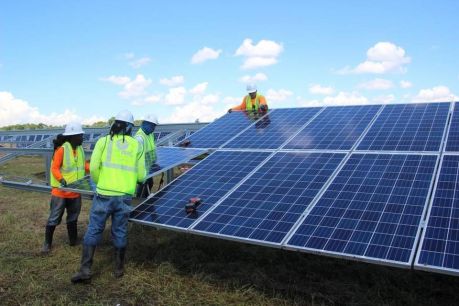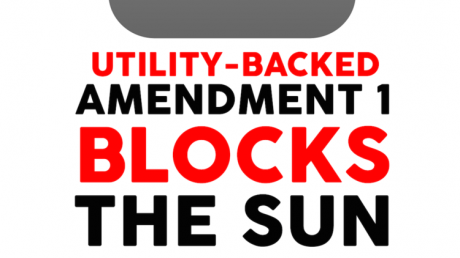UPDATED 10/5 | Florida residents expected to vote on a constitutional amendment Nov. 8 that potentially shifts solar energy policy into the hands of large utility companies appear widely misled regarding the ballot, according to the director of a poll that shows strong support for Amendment 1.
“Despite the lack of knowledge about what the amendment would do, it looks poised for success,” said Frank Orlando of the St. Leo University Polling Institute. “Utility companies have spent money to wage a very successful campaign. … while the pro-alternative energy groups have had a much more difficult time marshaling the opposition.”
 Orlando’s statement accompanied the St. Leo poll that indicates 84 percent of likely voters support Amendment 1, a solar energy proposal that power companies funded and acknowledged crafting. The results of the poll, conducted online from Sept. 7-10, were first reported by Florida Politics.
Orlando’s statement accompanied the St. Leo poll that indicates 84 percent of likely voters support Amendment 1, a solar energy proposal that power companies funded and acknowledged crafting. The results of the poll, conducted online from Sept. 7-10, were first reported by Florida Politics.
“Support for the amendment continues to climb,” Orlando said, referring to St. Leo's poll in June that showed 77.3 percent in favor.
Reports on money spent by power companies to back Amendment 1 vary between $16.4 million and $21 million. The ballot initiative is the second-most expensive in Florida history, according to the South Florida Sun-Sentinel. Donations by power companies made Smart Solar the richest political committee in Florida in 2015.
“It is a tough fight,” said Stephen Smith, director of the Southern Alliance for Clean Energy. “They have spent over $21 million. … The true intent of this ballot is deceptive. People are responding to the strong support for solar [while] the utilities are covering their plan to destroy the customer-owned market in Florida with punitive charges in the future.
“If people understand that, the support drops sharply.”
Consumers for Smart Solar, the sponsor of Amendment 1, is led by Dick Batchelor and Jim Kallinger, each a former state Representative from opposite sides of the political aisle in central Florida.
"This poll is further proof that our message is resonating with Floridians," Smart Solar spokeswoman Sarah Bascom said Wednesday in an email. "Amendment 1 gives our Sunshine State a historic opportunity to advance solar while safeguarding consumer rights, consumer protections and consumer fairness."
Smith was among a diverse coalition of solar energy advocates that founded Floridians for Solar Choice in January 2015. The group was unsuccessful with an initiative to allow homeowners and entrepreneurs to install and generate up to 2 megawatts of solar and also sell electricity to neighbors and businesses.
Only utilities can sell power under current Florida law. That doesn’t change under language in Amendment 1, including a promise “to ensure that consumers who do not choose to install solar are not required to subsidize the costs of backup power and electric grid access to those who do.”
That’s the biggest hitch, say opponents, including several newspaper editorial boards. A likely target is net metering, a common policy in most states, including Florida, that requires utilities to buy electricity from homes that generate excess solar power.
 “If this amendment passes, the utility companies could argue that net metering is a ‘subsidy’ and, since it's in the state constitution, lawmakers would have to ban it,” the Sun-Sentinel wrote Sept. 30. “Solar energy costs could then rise, making it less affordable for consumers. There's no evidence this would help save money for non-solar users.”
“If this amendment passes, the utility companies could argue that net metering is a ‘subsidy’ and, since it's in the state constitution, lawmakers would have to ban it,” the Sun-Sentinel wrote Sept. 30. “Solar energy costs could then rise, making it less affordable for consumers. There's no evidence this would help save money for non-solar users.”
Bascom, a veteran corporate and political communications adviser, said Amendment 1 will allow "government to retain its current authority to stop unfair subsidies."
"Amendment 1 does not preclude or hinder any approach to solar," Bascom said. "It merely ensures that whatever approach to solar Florida takes, government will be able to protect consumers from scams, rip-offs and unsafe solar installations."
The Bradenton Herald, Gainesville Sun, and Miami Community Newspapers also came out in September against Amendment 1. Jennifer Rennicks, a spokeswoman for Solar Choice and SACE, said “more [are] pending based on conversations with editorial boards.”
The Bradenton Herald wrote: “Reading between the lines, solar customers connected to FPL’s grid should expect surcharges, though the company has stated no decision has been made.”
Smart Solar’s ballot initiative emerged in July through cooperation with power companies and in response to consumer-friendly Solar Choice. The initiative oddly stresses existing consumer rights, including the right Floridians with solar equipment already possess under state law and rules to generate power for their own use.
At the time, FPL spokeswoman Alys Daly told The Daily Fray in an email: “We have appreciated the opportunity to offer technical and policy assistance to Consumers for Smart Solar in the development of their amendment.”
Amendment 1, Smith said, “should have never got through the Florida Supreme Court. It is classic ‘hiding the ball’ from voters.”
 Justice Barbara Pariente (right) agreed in a dissenting opinion March 31, saying the initiative was “masquerading as a pro-solar initiative.”
Justice Barbara Pariente (right) agreed in a dissenting opinion March 31, saying the initiative was “masquerading as a pro-solar initiative.”
“This amendment … actually seeks to constitutionalize the status quo,” Pariente wrote. “The ballot title is misleading by its focus on ‘Solar Energy Choice,’ when no real choice exists for those who favor expansion of solar energy.”
In August, 73 percent of voters passed Amendment 4, a measure that extends a residential tax break for renewable energy systems to commercial properties and was supported by Solar Choice and multiple clean energy supporters.
Last week, the Florida Wildlife Federation joined other eco groups aligned against Amendment 1.
“Corporate manipulation of the voting process in Florida is a bad idea,” Smith said his email to The Fray. “That said …. more people are understanding the true nature of this every day, and we are shooting for the 40 percent needed to block this.”
> Editor's note: This story was updated Wednesday after Smart Solar responded to emails initially seeking input on Monday.
> Photos this page via Bradenton Herald, South Florida Sun-Sentinel
Outside
Bitcoin mining emissions in China will hit 130 million tonnes by 2024 https://t.co/w6He7so8N2 pic.twitter.com/qYUDtBdeRK
— New Scientist (@newscientist) April 9, 2021
The Gunk Report
For the Blue-Green Algal Bloom Weekly Update from the Florida Department of Environmental Protection, tap here. For DEP's Algal Bloom Sampling Map, tap here.
What, me worry?
» "PLAYING WITH SHARKS," which recently premiered at the Sundance Film Festival, documents diving legend Valerie Taylor.